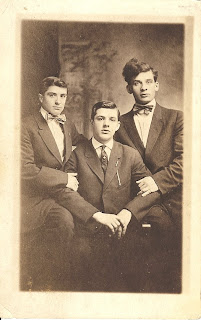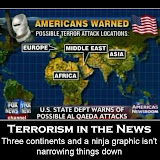Sorry about the hiatus. I was attending the funeral for my Grandfather and Grandmother at Arlington National Cemetery (they passed away within three weeks of each other). My gramps was a Silver Star and Purple Heart (x4) recipient during WWII, and the service provided by the civilian and military staff on the hallowed ground was truly amazing. My Father asked me to publish the eulogy, and it's an excellent testament to their life. Check it out:
June 10, 1945
Oriong Pass, Luzon, Philippine Islands.
The 2d Battalion, 145th Infantry was given the mission of passing through the 3d Battalion in order to force the entrance to Oriong Pass, Luzon, Philippine Islands, which was strongly defended by a reinforced battalion of enemy. Company E, 145th Infantry, was given the mission of advancing along Highway Number 5 to secure a bridge which was dominated on either side by towering hills. As the company approached the bridge, the leading elements were met with a hail of rifle and machine gun fire. A minimum of five heavy and light machine guns, emplaced on the high ground to both flanks, were sited with deadly accuracy on the 75 yard stretch of road leading to the bridge. The company continued to advance until two squads of the leading platoon had worked across the bridge. At this time, the entire fire power of the defending enemy force was placed on the leading platoon and supporting elements of Company E. By 1430, five men had been seriously wounded or killed in the fight and the position of the squads across the bridge had become critical.
Captain R.A., Company Commander of Company E, went rapidly forward along the road shoulder toward the bridge to extricate the leading platoon from its precarious position. The enemy, from his excellent points of observation on both flanks, noted the activity and immediately interdicted the road with knee mortar, machine gun and rifle fire. Captain R.A., without hesitation, advanced to the point where his leading platoon was receiving a deadly rain of fire. Upon arriving he made a visual reconnaissance to determine the locations and strength of the enemy, and in order to gain better observation walked to the center of the road, at his full height. An enemy rifleman on the other side of the bridge directed his fire on Captain R.A., seriously wounding him through the throat and face. Bleeding copiously, he staggered a few yards and collapsed on the road 50 yards from the bridge. While lying in the road, the Captain continued to search the area ahead in order to direct the fire of his men.
As the fire fight increased in intensity, Major Stephen L. Garay, Regimental Operations Officer, left the forward Regimental Command Post, and advanced a distance of two hundred yards. Oblivious to the rifle and machine gun fire concentrated on the road, Major Garay rushed to Captain R.A.’s side and by his cool presence of mind, undoubtedly saved his life. The position of the wound prohibited the use of a tourniquet, so Major Garay, in a matter of seconds, applied a Carlisle bandage and succeeded in stemming the heavy flow of blood, until the Company aid man, Technician Fifth Grade Jesse D. Womack, came forward.
While they applied compressions, Captain R.A. passed onto the Major all the information that his reconnaissance had netted, together with his suggestions as to advisable counter-action to be taken. Major Garay and Corporal Womack then procured a stretcher and evacuated the wounded officer. The road was still under small arms fire and the problem of evacuation presented extreme difficulty. The litter was carried a distance of 125 yards to a defiladed position where plasma was administered.
Captain R.A.’s willingness to expose himself to the observation and bitter fire of the enemy and his persistence and devotion to duty in spite of a dangerous and painful wound made the subsequent withdrawal of his company possible without further casualties. Had it not been for Major Garay’s prompt action at the critical moment when Captain R.A. lay in the road on the verge of death, it is entirely probable that the wounded officer would have bled to death.
Captain R.A., 23 years old at the time, and Major Garay were each awarded the Silver Medal. I was quoting from the recommendation letters written to the commanding general of the 37th infantry division in September 1945.
There are many lessons to be learned here. You probably heard these at high school commencements, but I think since you all knew R.A., it gives these lessons additional context and depth.
Clearly we see the incredible level of courage, of persistence, of duty, of risk taking and of shared sacrifice. These are self-evident.
I want to also talk about 2 lessons, that aren’t quite as obvious.
One is the thin line between success and failure. If the bullet that went through his neck had been 1 cm farther over, a mere centimeter, it could easily have severed a major blood vessel.
If that had happened, even the heroic efforts of Major Garay would have been for naught. Bill and Emily wouldn’t be at this memorial today. And for Meryl, David, me, and the grandchildren – we wouldn’t be here, at all.
But we are here in Washington D.C., next to Arlington National Cemetery. And who knows how many other men, children, grandchildren and great-grand children are alive today because of the actions on a remote jungle road in the South Pacific on that hot and steamy day in June, 63 years ago.
Another lesson needs to be viewed in the broader context of R.A.’s life. As you know, after having enlisted in the army on December 8, 1941, he finally made it home to Dearborn in 1945. He married E.B.. He went to work at Ford, or “Ford’s,” as it was called in our house. He became an executive there. He worked with a lot of storied people in the auto industry, like the legendary “whiz kids,” one of whom was Robert McNamara. He had a heart attack there in 1972, when he was younger than I am today, and he went to work the next day. He didn’t even know it was a heart attack until months later when he finally went to a doctor. He spent 37 years at Ford. The last 8 years he worked for Ford were in, of all places, Japan. At the time, Lee Iacocca, a name you may have heard, called R.A. into his office to discuss this potential overseas assignment. Knowing R.A.’s war record, he asked R.A. if going to Japan to build a Far East supply base for Ford is something he would do. And this is where I see the lessons of professionalism, magnanimity, and perhaps even forgiveness. Japan, the bitter enemy that he helped defeat, became our parents’ home for 8 years. He helped source billions of dollars of components from there, and so, in his own way helped to rebuild Japan into what is today one of our strongest allies.
Let’s turn to E.B., because there are some great lessons here too. As you know, R.A. was a really smart guy, with 2 degrees from the University of Michigan. I think he was academically ranked third or so in his high school class at Dearborn Fordson. But I know who ranked higher than him – that was E.B..
Both E.B. and R.A. grew up in Dearborn. Their parents, my grandparents were from the “old country.” E.B.’s parents had immigrated from the Ukraine and R.A.’s parents from Italy, both around 1912. So, E.B. and R.A. both grew up with immigrant parents with next to nothing during the Great Depression. E.B. worked her way through what is now Henry Ford Community College and Wayne State University, taking the street car to get to school. She became an elementary school teacher during the war years.
After the war they got married. And they stay married for 62 years, R.A. preceding E.B. in death by a mere three weeks.
E.B. was very bright with a very strong personality and probably could have done a lot of things on her own, but she chose the role of wife, stay-at-home mom and caregiver to the family. I know when I was 11 years old and broke my arm, it was E.B. who calmly took me to the hospital. When R.A. showed up and saw my twisted arm, it put him in a state of near panic.
So what are some of the lessons from E.B.’s life? There is the lesson of self-sacrifice for the sake of R.A.’s career and the family. There’s the lesson of being a team player. A boss once told me that a great team player is a person who plays their position really well. “The Team” – R.A. and E.B. made a great pair. R.A.: Loud and enthusiastic, but with no sense of direction, always over-indulging in food, and at many times oblivious to whatever might be going on around him. E.B.: Calm, dutiful, dignified, keeping all four wheels on the cart, and keeping the cart heading down the road in the right direction. I even grow nostalgic for their bickering, every jab of her “Hartwell humor,” parried with his “Chase Road wit.”
As they approached their mid-80’s, the last few years became more and more difficult. There were numerous trips to Beaumont Hospital and both of them proved resilient through numerous medical problems: R.A. had two major open heart surgeries, cancer and diabetes. E.B. had cancer surgery and a blood ailment, which I’m not sure the doctors ever quite figured out, but it left her weak and jaundiced much of the time. About 3 years ago, as R.A.’s mental faculties started to wane and he became unable to get around without someone pushing him in a wheel chair, we finally moved him to a nursing facility just up the road from their home. E.B. would visit him every day. Finally, E.B. couldn’t make the trips unassisted herself. So the daily trips slowed to once a week when someone could take her. Still she persisted and remained resolute. On a quiet Sunday afternoon last month, R.A. peacefully passed in his sleep. We had a wonderful reunion at the visitation. Many people were there who I had not seen in years from the days in Spain and Japan, many friends, many of the old warriors from Ford purchasing. It was especially nice for E.B., because she got to visit with all these people, what turned out to be, one last time.
E.B. also passed away, just three weeks after R.A. I feel fortunate that Emily and I were with her at the end. Why she died so soon after R.A., I don’t know. Whether it was her own failing health, the stress of R.A.’s passing, or just missing R.A., I don’t know. I’ll always believe it was the last.
And so tomorrow, we will bury them together in the consecrated ground at Arlington National Cemetery. We’ll miss them both. Thank you.
When World War II came to a close, Captain R.A. had been awarded the following medals for service to his country:
Purple Heart with 3 Clusters
Bronze Star with 2 Clusters
Silver Star
The Distinguished Unit CitationHere's some pics to provide context:


The Greatest Generation indeed! Where admirable and iconic lives are commonplace.







 See what the others have said:
See what the others have said:
0 comments:
Post a Comment